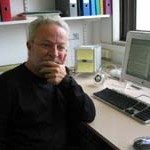Link to Pubmed [PMID] – 3259606
J. Immunol. 1988 Jun;140(12):4097-102
These experiments were designed to evaluate whether alterations in Id expression after anti-Id treatments result from direct modulation of Id-producing B cells, and whether idiotypic selection operates in bone marrow or spleen B cells. By using the NPb Id model, we have studied the functional behavior of isolated LPS-reactive B cells transferred from B6 mice into histocompatible LPS-NR B10.Cr hosts and primed with LPS conjugates of anti-Id antibodies. We have found that previous anti-idiotypic manipulation of host mice by neonatal administration of suppressive doses of Ac 38 antibodies, or adult injection of enhancing doses of Ac 146 antibodies, modulated the T cell-independent Id response of either immature bone marrow or mature splenic responding cells, transferred from normal, untreated donors. These results are interpreted to suggest that selection of antibody repertoires by anti-Id may occur at multiple steps of B cell differentiation.
